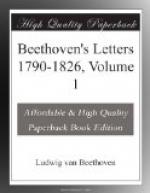[K.]
[Footnote 1: Joh. Mich. Vogl, born August 10th, 1768, was Court opera singer (tenor) in Vienna from 1794 to 1822; he died November 19th, 1840.]
[Footnote 2: Forti, born June 8th, 1790, a member of the Royal Court Theatre (a barytone), pensioned off in 1834.]
127.
DEPOSITION.
1814.
I voluntarily presented Maelzel gratis with a “Battle Symphony” for his panharmonica. After having kept it for some time, he brought me back the score, which he had already begun to engrave, saying that he wished it to be harmonized for a full orchestra. The idea of a battle had already occurred to me, which, however, could not be performed on his panharmonica. We agreed to select this and some more of my works [see No. 116] to be given at the concert for the benefit of disabled soldiers. At that very time I became involved in the most frightful pecuniary difficulties. Forsaken by every one in Vienna, and in daily expectation of remittances, &c., Maelzel offered me fifty gold ducats, which I accepted, saying that I would either repay them, or allow him to take the work to London, (provided I did not go there myself with him,) referring him to an English publisher for payment.
I got back from him the score written for the panharmonica. The concerts then took place, and during that time Herr Maelzel’s designs and character were first fully revealed. Without my consent, he stated on the bills of the concert that the work was his property. Indignant at this, I insisted on his destroying these bills. He then stated that I had given it to him as a friendly act, because he was going to London. To this I did not object, believing that I had reserved the right to state the conditions on which the work should be his own. I remember that when the bills were being printed, I violently opposed them, but the time was too short, as I was still writing the work. In all the fire of inspiration, and absorbed in my composition, I scarcely thought at all on the subject. Immediately after the first concert in the University Hall, I was told on all sides, and by people on whom I could rely, that Maelzel had everywhere given out he had paid me 400 gold ducats for the Symphony. I sent what follows to a newspaper, but the editor would not insert it, as Maelzel stands well with them all. As soon as the first concert was over, I repaid Maelzel his fifty ducats, declaring that having discovered




